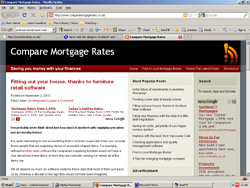I mentioned in the week 3 results of by
SEO Experiment that something strange happened on day 21. I didn't want to say what had happened to see if a pattern formed, and it certainly did.
First, it's interesting to note that although both blogs that are linked to have links on the same places, Google is reporting that blog 2 has 7 links, blog 3 only has 6 links. It seems that 1 of the links was missed by Google.
So, we might expect site 1, with no links, to be least popular, site 2 with most links to be most popular and site 3, with almost the same number of links to have almost the same popularity. But do search engines ever do what we expect?
Well on Yahoo, site 1 is ignored - it isn't getting the pings. But sites 2 & 3 are similar. But then I never questioned whether it took note of the target="_blank" statement.
On Google, here's the latest days' results for number of pages cached...
Day 20 - Site 1 still has 3 pages cached, site 2 8 pages but site 3 suddenly takes the lead with 9.
Days 21 & 22 were the same as day 20.
Day 23 and site 2 lost a page.
Day 24 and site 1 increases to 4 pages, 2 drops to 7 and 3 drops to 8. Interesting to note that site 2 was mostly cached end of October, site 3 beginning of November.
Day 25 and sites 2 & 3 both lose another page.
Day 26 no change.
Day 27 (today) and site 2 has dropped to 2 pages.
I can't explain why the site with no links has 4 pages cached, the site with most links has just 2 pages and the one in the middle has 7 pages and that's the only one to have been cached recently.
So as far as Google is concerned, the site with no links is doing better than the one with most links. It could be that because of the better links site 2 was cached and dealt with earlier and is showing a pattern the other 2 sites will show but 8 - 10 days or more further behind. I'll keep watching...
 I'll continue the look at trying to find out just what is the best anchor text for use within a link by reviewing what has happened to both sites after 5 weeks. To see what else has happened, have a look at the Best Anchor Text Experiment.
I'll continue the look at trying to find out just what is the best anchor text for use within a link by reviewing what has happened to both sites after 5 weeks. To see what else has happened, have a look at the Best Anchor Text Experiment.

 Definite movements on the experiments this week - a lot to learn about what types of links work best overall.
Definite movements on the experiments this week - a lot to learn about what types of links work best overall.

 Or at least the first paragraph. Why?
Or at least the first paragraph. Why?
 I recently published
I recently published  The guy's products are about to be featured on the TV this weekend – something like
The guy's products are about to be featured on the TV this weekend – something like 







